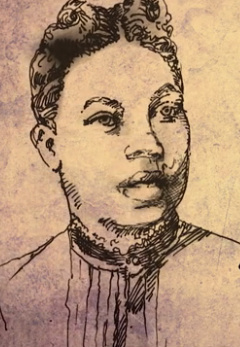Caroline LeCount facts for kids
Quick facts for kids
Caroline LeCount
|
|
|---|---|
 |
|
| Born |
Caroline Rebecca Le Count
c. 1846 Philadelphia, Pennsylvania
|
| Died | January 24, 1923 (aged 76–77) |
| Resting place | Eden Cemetery |
| Education | Institute for Colored Youth |
| Known for | Anti-segregation activism |
| Partner(s) | Octavius Catto |
Caroline LeCount (born around 1846 – died January 24, 1923) was an important African-American teacher and civil rights leader from Philadelphia, Pennsylvania. She is often compared to Rosa Parks because she worked hard to end unfair rules on public transportation. She was engaged to Octavius Catto until he passed away in 1871.
Contents
Early Life and Education
Caroline LeCount was born in South Philadelphia in 1846. She was one of four children. Her father, James LeCount, was a cabinet maker and undertaker. Stories say he helped people escape slavery.
Caroline started school when she was young. She graduated at the top of her class in 1863. This was from the Institute for Colored Youth.
A Career in Teaching
Caroline LeCount was the first black woman in Philadelphia to pass the teaching exam. After passing, she began teaching at the Ohio Street School. This school was later renamed the Octavius V. Catto School. Around 1868, she became a principal. This made her the second black female principal in Philadelphia.
She famously defended black teachers. Some people unfairly said black teachers were not as good. Caroline pointed out that black teachers had to get higher test scores than white teachers to be certified. She retired from teaching in 1911.
LeCount was also a talented speaker. She was good at reading poetry aloud. She read at the openings of many churches. People noted her ability to imitate different accents when she spoke.
Fighting for Fairness
Caroline LeCount was part of the Ladies' Union Association. This group of women supported the Union during the American Civil War. As part of their work, she and other black women rode streetcars. They delivered supplies to soldiers. This was brave because black riders were often forced off the streetcars.
Caroline and others would get on the streetcar. They would be forced off. Then, they would ask the courts and the public to stop this unfair treatment. LeCount, along with her fiancé Octavius Catto and abolitionist William Still, also asked for laws to end segregation. One historian said that Caroline LeCount did "almost the same thing as Rosa Parks did." But Caroline's streetcar in 1867 was pulled by a horse.
In 1867, Philadelphia passed a law banning segregation on public transport. LeCount successfully sued a driver who would not let her ride. After this, the city officially told all transit companies they could no longer treat black passengers unfairly.
Later Life and Impact
Caroline LeCount passed away on January 24, 1923. She was buried at Eden Cemetery in Collingdale, Pennsylvania. Because she refused to leave segregated streetcars, some news outlets today call her "Philly's Rosa Parks."
In 2022, some people in Philadelphia started asking to rename Taney Street after her. This street was named for Roger B. Taney. He was the Supreme Court justice who made the unfair decision in the Dred Scott v. Sandford case.
See also
 | Jewel Prestage |
 | Ella Baker |
 | Fannie Lou Hamer |

